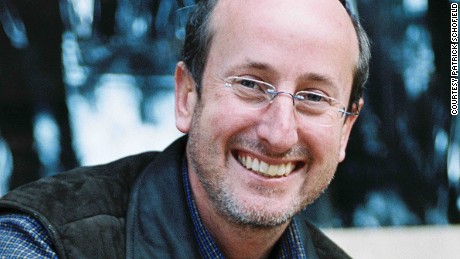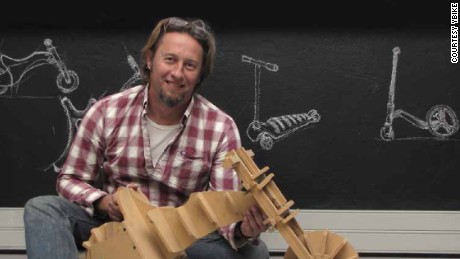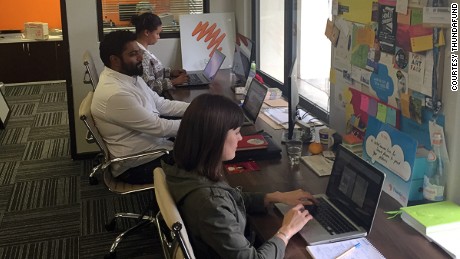(CNN)In the egalitarian world of crowdfunding, most sites are much the same -- largely passive templates for start-ups to vie for investment.
While these tools may be advantageous abroad, in Africa... not so much. What works in New York might not necessarily work in Cape Town.
Knowing this, one South African company has created an ethically-conscious platform for entrepreneurs from the continent -- and it's leaving its rivals by the wayside in the process.
Thundafund, launched by Patrick Schofield in 2013, has seen unprecedented success and spawned a new way of thinking among the crowdfunding community. How? By working closely with entrepreneurs to get the best out of their ideas.

"I've seen so many failed dreams," Schofield explains. "People have put their hearts and souls into businesses, their life savings into an idea they think is awesome, only to find out marketers don't like it." But with Thundafund "you actually get to ask the market whether it's a good idea."
This in essence is the modus operandi for all crowdfunding sites, and Schofield is forthcoming in his praise for the "fantastic" Kickstarter and Indigogo.
Thundafund is different however, explains Jaco Kruger, Managing Director of YBike, who launched a campaign attracting 50,000ZAR ($4,100) of investment in 2013.
"Kickstarter doesn't really work in South Africa... it's a difficult market to break in to... It could be said [Kickstarter] is more about making money than empowering people; there's no responsibility towards funding more entrepreneurs. Patrick is providing opportunities and helping communities."
A new way of doing business
Good ideas are "a dime a dozen" Schofield says, but many South Africans lack the "the skills and resources" to bring their idea through to fruition. New businesses that do receive funding are often saddled with heavy debts or give away significant portions of their company to investors in return for guidance. Whilst the likes of Kickstarter "stand aside" once a campaign is launched according to Kruger, Thundafund has guided its entrepreneurs through the process, optimizing their chance of attracting investors.

This involves utilizing multimedia channels and social networks. Schofield stresses the importance of embedded videos as a means of articulating a project's vision, but says online platforms are far from the only path. One campaign in a small community with low levels of internet uptake, reached its funding target by holding talks in the local church and library.
"It's not all digital and straightforward," Schofield explains. Indeed, over a third of Thundafund's investors used bank transfers to make pledges. With that in mind the company has limited its scope to national entrepreneurs.
A history of success
Over 1,400 projects have been submitted so far, with 160 finding their way on to the site. The reason behind the cull is largely due to projects realizing "they're not financially viable" during the collaborative process with Thundafund, Schofield says, or coming to the conclusion that more work needs to be done to make them so. He admits however some shrewd business decisions needed to be made on his part: "We wanted to show that crowdfunding can be successful in South Africa, and to do that we needed success stories."
Amongst those is Honest Chocolate, who raised 70,000ZAR ($6,000) to turn their industrial raw chocolate business into a boutique café and shop. "Without the investment it would have been very difficult," explains co-owner Anthony Gird, "we had so many things to put it towards."

Key to their campaign was the effective use of incentives for investors, among them chocolate workshops.
"Seven months after our launch two people came in saying they'd come to claim their reward for investing. The campaigns have longevity as well."
Both Gird and Kruger acknowledge that as well as finance, the crowdfunding process is a fantastic marketing opportunity.
"It creates a build up and awareness... your target market is already activated," says Honest Chocolate's co-owner, whilst Y-Bikes, already an established company, "did very well" out of their campaign.
Not that the process is easy. "You can't just post and forget about it," Kruger explains. "It's a lot of work," says Gird, "a lot of admin, a lot of bookkeeping... keeping the energy going and keeping people informed."
With businesses like Honest Chocolate and Y-Bikes among the 70% of projects achieving sufficient funding, Thundafund has seen plenty of success. In comparison, Kickstarter stands at around 40%, whilst Indigogo's is less than 5%.
"There's been a few crowdfunding sites in South Africa that have failed," Kruger says, "and Patrick has made this work. He's building it slow, the way it should be built."
Planning for the future
Now that the viability of the platform has been established, Schofield is looking forward to reducing the percentage of successful campaigns and increasing the democratization of the crowdfunding process. But where will that leave South Africa's fledgling start-ups?
Schofield has recently launched Ripple, a platform dedicated to community causes and activism. Such campaigns had a strong presence on Thundafund, including the solar powered Sunshine Cinema and one of Schofield's favourites, The Secret Love Project, which manufactured waterproof outfits for Cape Town's homeless, who then had the opportunity to send a message back to their investor. Schofield concedes however that "it can be a bit difficult when you have a charity project sitting next to a business project within the same space," hence the schism.
South African entrepreneurs should be far from concerned by the shake-up. In fact, it looks like there will be even more support on the horizon. The two crowdfunding sites will be advised by the Africa Centre, which Schofield describes as "a supportive network for social entrepreneurship... a space for people to ask questions and receive advice," as well as "workshops and one-to-one mentorships."
As Kruger says, Schofield is not just a businessman but a tutor within the crowdfunding sector and "that's unique, that's brilliant."
Source Article from http://rss.cnn.com/~r/rss/cnn_tech/~3/f39fwT9DPvA/index.html http://revealedtech.com/image/gif;base64,R0lGODlhEAAJAJEAAAAAAP///////wAAACH5BAEAAAIALAAAAAAQAAkAAAIKlI+py+0Po5yUFQA7
The crowdfunding platform made for Africa
No comments:
Post a Comment